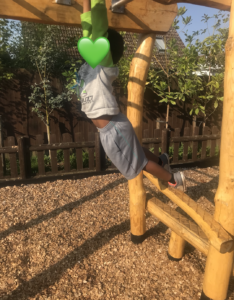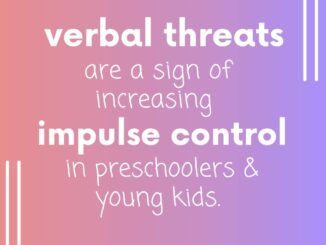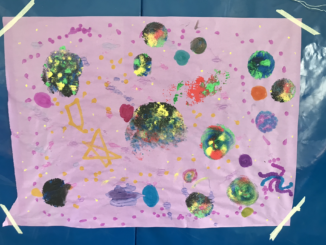We went to a new playground recently. Monkey bars are rarer here in the UK (at least in my rural area) than they were at playgrounds in the states. As far as I can tell, this might’ve been the first time in awhile that my son has encountered them, maybe the very first time he’s been tall enough to reach them.
He hung on the first bar for a long time. He’s tall enough to reach out to the second bar and hang there before his feet leave the ladder, so he did that too. Lots of times of hanging for 30 seconds, or 60 seconds, or even 90 seconds and then falling, landing, getting back up.
Then he started experimenting. Still not leaving the bar that he could touch from the ladder. He would hang from a bar, then swing his legs back to the ladder and balance that way, then let go with his legs, then reconnect his legs. Still making no “forward” progress.
Swinging your legs back and forth, changing your center of gravity while still holding on, is a really strong skill, a hard thing to do. Even balancing on tiptoe with your feet on the ladder and your hands on the bar is strengthening muscles and working out your core muscles especially. The core is super important in a million things and monkey bars is one of them! You have to use your core to push yourself forward with enough momentum to get to the next bar.
Watching him reminded me of a school I used to work at in the states. They would tell the kids that they were only allowed to use the monkey bars in one direction (like a one way street), and once you had gone out, no going back. They would have a recess monitor block kids’ feet from going back and touching the ladder once they’d started going and say “You have to move forward”. Their reasoning was similar to that of why kids couldn’t go up slides (another powerful strengthening activity)—because the kids all needed to go one way, to avoid traffic backups or kids fighting or having to disagree about who should go where, etc.
But I couldn’t help but think about how much free play and strengthening work those kids missed out on by having their “play” turned into a dictated exercise. They weren’t following the lead of their bodies and learning how to move and get stronger.
My son worked his way up to daring to reach out for the third bar. He gripped it underhand instead of overhand, accidentally turning himself 180 degrees to face the other way. He yelled with delight and surprise and made his way back to the ladder. Going “backward” again! Wouldn’t have been allowed at the school. Now he had a hypothesis about what he had done with his body. He got back up and practiced again, experimenting with how the underhand grip versus the overhand grip would move his body in space.
All of this, by the way, was while sharing the monkey bars with four other children. So it’s not like he only had the luxury of being the only kid on the playground. There was negotiating over whose turn it was, debate and discussion and letting someone else go and cutting in front of someone else and all the normal childhood things mixed in with this, too.
He experimented, he fell, he got back up, he tried again. I let him know that sometimes people’s hands get tired after awhile and they start doing worse than they were doing at first because their hands are tired! I’ve written before about his tendency to pick a playground challenge and just hammer away at it for ages and ages, with great frustration sometimes as I won’t do it for him or put him on things he can’t do himself.
He made it to the fifth bar, with great enthusiasm and rejoicing and a whole lot of important strengthening: his hands, his grip, his fingers, his wrists, his elbows, his shoulders, his core/trunk muscles. His eyes, calculating how far to the next bar, predicting, and then sending an arm out for instant sensory feedback about his prediction. His brain’s ability to plan a new action with his body and muscles and then carry it out. His sense of self-pride and determination. A million little things he needs before he needs to enter the adult world of fine motor precision and academic concerns. A million little things I want for every kid I work with.




